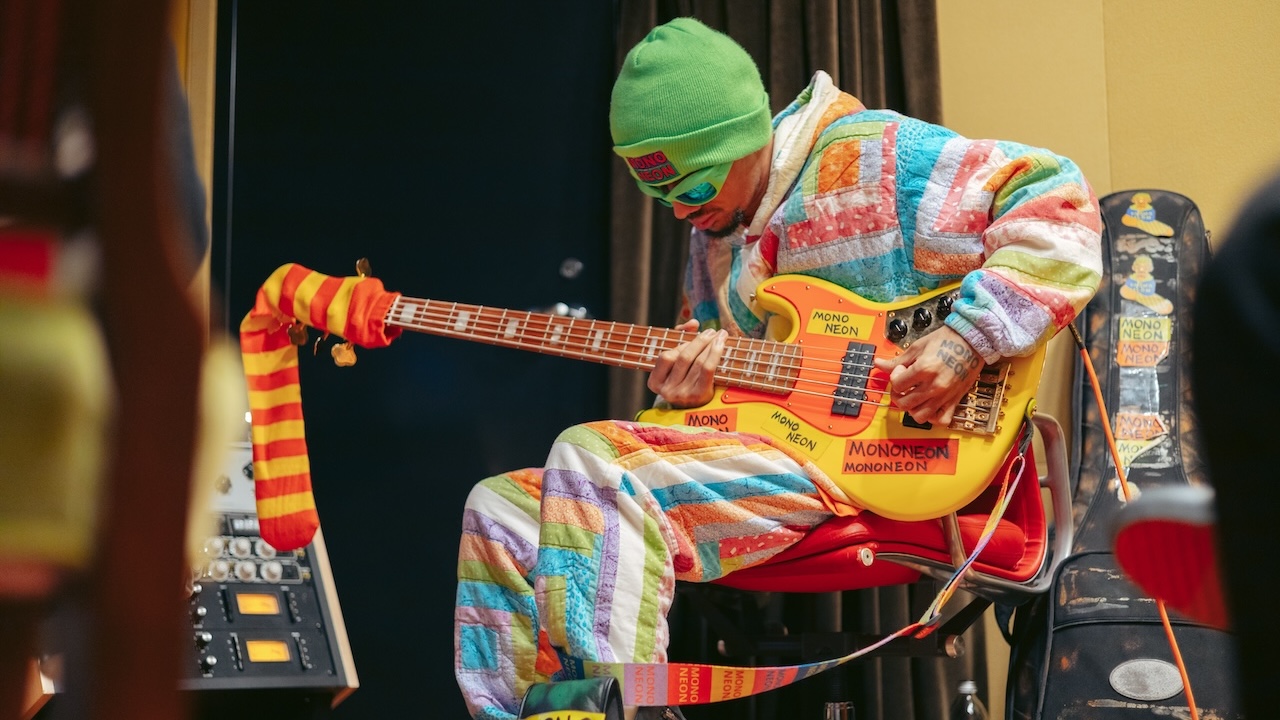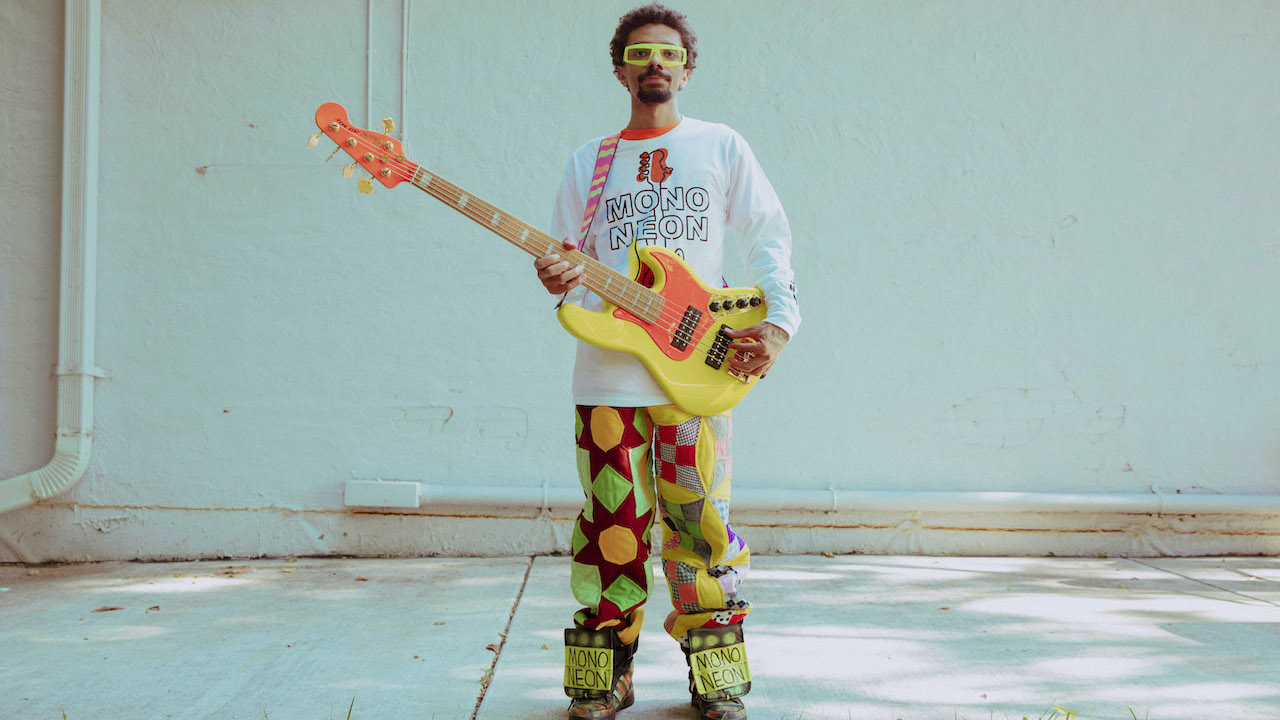“I won my first Grammy playing bass with Nas, but the time I had with Prince at Paisley Park was life-changing”: MonoNeon on collaborating with giants, forging his own path – and why he plays with a sock on the headstock of his Fender signature bass
The Jacob Collier, Mac Miller and Prince collaborator reveals the bassline he wishes he'd written, and reflects on the mind-blowing experience of having Mavis Staples and George Clinton guest on his new album

Anyone who wants to know where the world of bass guitar is going simply needs to check YouTube, TikTok and Instagram, where a whole new generation of super-talented bass players are pushing the instrument forward.
And yet, Dywane Thomas Jr, aka MonoNeon, isn't just a bass player – he is a whole way of approaching life, built on a philosophy that’s embraced by his 460,000 Instagram followers.
What makes him stand out on the crowded playing field of social media is that his videos are both funny and mesmerising, whether he’s harmonizing the speech of a democratic debate, or playing to a woman eating a hot pepper.
MonoNeon’s latest album, Quilted Stereo, is a masterful fusion of funk, hip-hop, blues, and myriad other influences, once again exhibiting the genre-blending prowess that makes his sound unique.
This approach also serves his bass playing well, allowing him to express himself in a wide range of environments, as he's done with artists from Prince and Jacob Collier to Nas and Mac Miller.
Check out his tricked-out signature Jazz Bass, too – it has its own, wholly unusual charm. He also plays a right-handed bass left-handed, leading to an unusual but extremely funky slap technique.
“The MonoNeon concept is all about autonomy, determination and imagination,” he told Bass Player. “I’ve always been fascinated with the fluorescent light art of Dan Flavin, Chryssa, and Joseph Kosuth, and all those high visibility colors that construction workers wear! That all helped to form this MonoNeon thing.”
Get The Pick Newsletter
All the latest guitar news, interviews, lessons, reviews, deals and more, direct to your inbox!

Looking at your YouTube channel, you will play to anything and everything. From a Formula One car race, to a woman freaking out after eating a hot pepper. What made you want to play bass to that?
“Man, I just be hearing shit and I just go after it. I know there’s something in anything and everything. My love for John Cage helped me understand that. Keeping my curiosity and childlikeness at the forefront of my music is very important to me.”
What’s your favourite song on the new album?
“My favorite song is called Stereo. That track has some chord shit in there that I like. There’s another song called Full Circle that Davy Nathan wrote for me as a duet with Mavis Staples, so that’s another highlight.”
On Supermane you covered almost every instrument. Is it the same on Quilted Stereo?
“I play the majority of the instruments, with my friend Davy Nathan. Davy is a keyboard wizard and he covers all that crazy synth and piano that you hear. He also does the drum programming whenever we don’t have a live drummer. I’m playing all the bass, some guitar, and some keyboard here and there.”
Between Prince, Nas, Mac Miller, and Jacob Collier, you’ve collaborated with some amazing musicians. Have there been any highlights?
“I won my first Grammy playing bass on All Bad by Nas, but playing with Prince will forever be the highlight for me. The time I had with Prince at Paisley Park was life-changing. Just being around him made me want to be a singer, and write songs, and just be onstage doing whatever I wanted to do.
“I’ve always been a fan of Jacob Collier. So I was also really happy to play bass on his song In My Bones.”
Mavis Staples and George Clinton both guest on the new album. What was that experience like?
“I was on a high for days after hearing Mavis Staples sing the second verse on Full Circle. My dad played bass with Mavis and Pops Staples back in the '90s, so it was definitely a full circle moment. And then I got to hang with George Clinton at his studio! Hearing him record for the song Quilted was a dream come true.”
Which musician would you still love to play with?
“I still wanna play some music with Donald Fagen, Pharrell and Tierra Whack.”
You’re known for your bass chops, but you don’t overplay on the new album. Is that a conscious choice?
“Maybe it’s a conscious choice, but I don’t know. I don’t really write from the bass. I usually sit down at the keyboard and look for harmonies that feel like me. I really care about songwriting.”
Are you using your Fender signature model on the new album?
“Yep, I used my signature Fender on a few tracks.”
Why do you often have a sock covering the entire headstock of your bass?
“It’s something that was inspired by Marcel Duchamp’s readymade artwork. I really like the rectified and readymade art he created.”
Who are your bass heroes?
“My dad, Dywane Thomas. He played bass with The Bar-Kays when James Alexander left, and I was obsessed with The Bar-Kays because of that. To have the attitude that he got on the bass is still a lifelong search for me.”
How did you get into bass?
“My dad gave me a guitar when I was four and I remember playing it like a bass. He was a touring musician, and he moved to Europe before I started elementary school, but he was around long enough that I knew I wanted to be like him. The love for music was already in me and I took that and ran with it.”
Who else influenced you as a bass player?
“Musicians from back home in Memphis. People like Shea Norman, Lance Lucas, Calvin Barnes, DJ Brown, and Rod Vester. Playing bass in church was always a music lesson for me. I’ve also been influenced by the way Pete Rock and J. Dilla hear bass.”
What was it like growing up in Memphis?
“Growing up in Memphis, I really had no choice but to listen to the blues and the southern soul music that my family played at home. I would be listening to Little Milton, Johnnie Taylor, Denise LaSalle, Bobby Rush, Tyrone Davis, and Albert King. I would also hear gospel songs from the Baptist church I went to with my grandma. All those subtle things shaped my style and how I feel about music.”
“My mom influenced my ear, too. She would play Toni Braxton and Whitney Houston songs during our car rides. And then my older cousins would play all the rap music that came out of Memphis, like Playa Fly, 8Ball & MJG.
“My grandad, Charles Thomas, was a jazz pianist and played with guys like Ron Carter, Billy Higgins, and Alan Dawson, so that also shaped me as a kid.”
What's your favourite bassline you’ve written?
“The bassline to Hot Cheetos.”
Is there a song you wish you’d written?
“I wish I’d written Optimistic by Sounds of Blackness. That song makes me happy and sad at the same time. I like songs that affect me like that.”
What else is coming up for you this year?
“It’s all about the Quilted Stereo album. I’m also thinking about putting out an album of me playing synthesizer. I’d call it MonoNeon On Synthesizer! But right now, I’m on the road with the Quilted Stereo Tour shows. I just want to keep living this music shit, man!”
- Quilted Stereo is out now.

Nick Wells was the Editor of Bass Guitar magazine from 2009 to 2011, before making strides into the world of Artist Relations with Sheldon Dingwall and Dingwall Guitars. He's also the producer of bass-centric documentaries, Walking the Changes and Beneath the Bassline, as well as Production Manager and Artist Liaison for ScottsBassLessons. In his free time, you'll find him jumping around his bedroom to Kool & The Gang while hammering the life out of his P-Bass.
“I asked him to get me four bass strings because I only had a $29 guitar from Sears”: Bootsy Collins is one of the all-time bass greats, but he started out on guitar. Here’s the sole reason why he switched
“I got that bass for $50 off this coke dealer. I don’t know what Jaco did to it, but he totally messed up the insides!” How Cro-Mags’ Harley Flanagan went from buying a Jaco Pastorius bass on the street to fronting one of hardcore’s most influential bands















